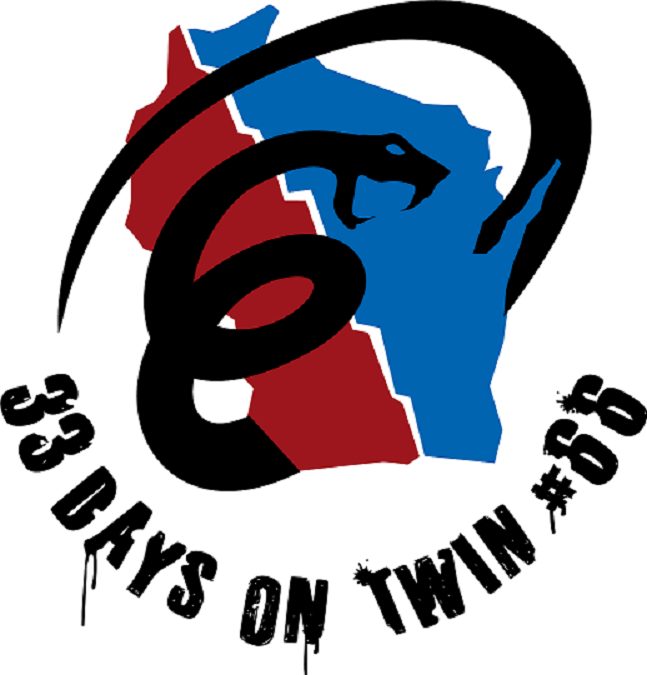
by Deep Green Resistance News Service | May 22, 2016 | ACTION, Protests & Symbolic Acts
By Sacred Water Sacred Land
Sacred Water Sacred Land is sponsoring a tar sands awareness walk through Wisconsin along Enbridge’s proposed Twin Line #66 starting with a kick-off event in Delevan or Walworth on June 8th.
33 Days on Twin #66, a Sacred Water Sacred Land sponsored walk, begins at the entry point of the Enbridge pipeline system, just south of Walworth, WI and follows the route northwest to Superior, raising awareness about the existence of, and proposed expansion to, the Enbridge crude and dilbit pipeline corridor along the way.
33 Days on Twin#66 will consist of consecutive daily 10-15 mile segments with community engagement talks in a revival type setting at overnight encampments at many points along the way. The 420-mile pipeline route is broken into four major sections: northern, upper central, lower central and lower.
Winona La Duke, who has fought tirelessly against the Sandpiper expansion in Minnesota, and her sister Lorna, will be riding with us on horseback along several sections of the walk.
Affected communities and landowners will be engaged by representatives of SWSL – Sacred Water Sacred Land, CELDF – Community Environmental Defense Fund, and WiSE – Wisconsin Safe Energy Alliance, through an ecological forum where the impact of the expansion and a broader conversation about the adverse effects of Canadian tar sands extraction and transport will be explained. Guest speakers will also address climate change and traditional ties to the land while local residents will be encouraged to share their stories and efforts towards healing it.
Through this effort, SWSL endeavors to not only draw attention to the tremendous hazards of tar sands/Bakken oil transport but also help communities imagine and co-create a more sustainable, health conscious society with an emphasis on renewables and non-toxic food systems.
We are looking for additional sponsors to lend credence and build support for the Walk. Sponsorship is welcome in many forms. We encourage you to share the Walk with your membership and follow us on Facebook where specific details will be posted as they solidify. If you wish to participate in greater measure, please contact SWSL directly.
It is past time to unify our efforts and promulgate ecological systems literacy. We hope you will join us as we work together towards a paradigm shift of social and environmental justice for the natural world and the next seven generations.
Cosponsored by WiSE, CELDF, and SWSL
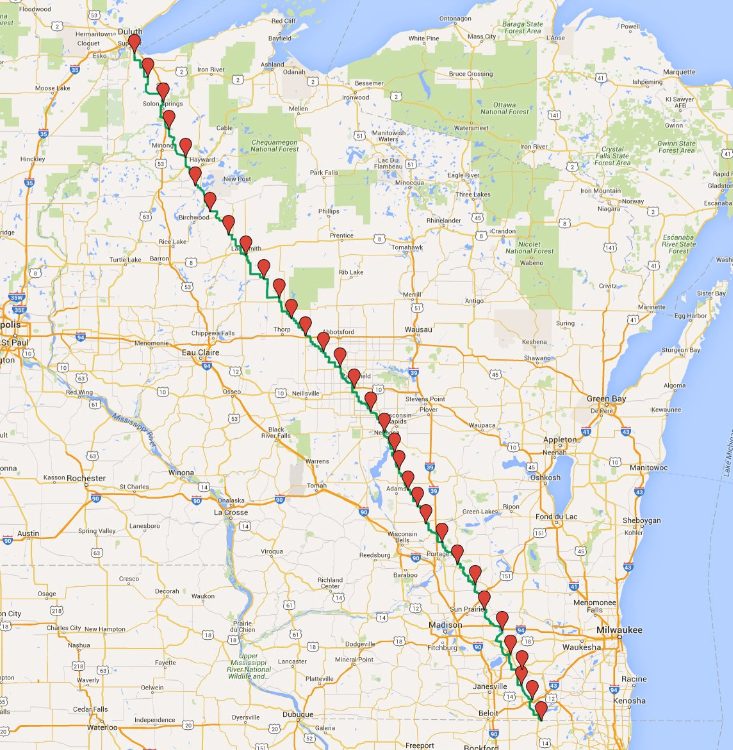
Schedule:
1 ~ June 8th – Walworth*, Kick-off!
2 ~ June 9th – Delavan*
3 ~ June 10th – Richmond
4 ~ June 11th – Whitewater*
5 ~ June 12th – Fort Atkinson*
6 ~ June 13th – Lake Mills*
7 ~ June 14th – Sun Prairie*
8 ~ June 15th – Columbus*
9 ~ June 16th – Wyocena
10 ~ June 17th -Portage*
11 ~ June 18th – Oxford*
12 ~ June 19th -Westfield
13 ~ June 2oth – Adams/Friendship*
14 ~ June 21st – Cottonville
15~ June 22nd – Lake Arrowhead
16 ~ June 23rd – Nekoosa*
17 ~ June 24th – Vesper
18 ~ June 25th – Marshfield*
19 ~ June 26th – Spencer
20 ~ June 27th – Riplinger
21 ~ June 28th – Owen/Withee*
22 ~ June 29th – Lublin
23 ~ July 30th – Gilman
24 ~ July 1st – Sheldon
25 ~ July 2nd – Ladysmith*
26 ~ July 3rd – Imalone
27 ~ July 4th – Meteor
28 ~ July 5th – Hauer-Stone Lake
29 ~ July 6th – Hayward
30 ~ July 7th – Gordon*
31 ~ July 8th – Salon Springs
32 ~ July 9th – Hillcrest
33 ~ July 10th – Superior*, Renewable Energy Independence Day!
* Denotes Revival
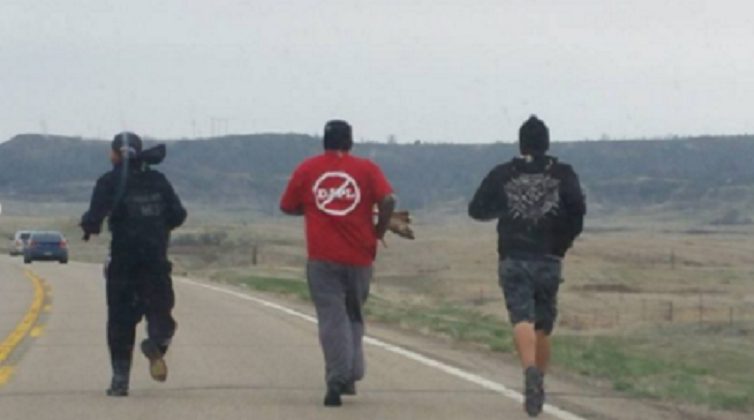
by Deep Green Resistance News Service | May 2, 2016 | Protests & Symbolic Acts
Omaha, NE – In solidarity with the ongoing fight against the Dakota Access pipeline, a group of Native and Non-native youth have organized a 500-mile spiritual relay run from Cannonball, ND to the district office of the United States Army Corps of Engineers (USACE) in Omaha, NE. The run is titled “Run For Your Life: No DAPL.” It departed the Cannonball community on April 24th, 2016 and plans to arrive in Omaha on May 3rd, 2016. The intention of the run is to deliver an unified statement to the USACE in resistance to the oil pipeline that proposed to cross beneath sacred water needed for life. The runners will will also turn over a petition calling for a full Environmental Impact Statement (EIS) to be conducted on the Bakken pipeline.
The running group is currently in Lake Andes, SD and plans for one day of rest, departing for Santee, NE on Thursday, April 28th.The participating runners are comprised of concerned citizens from across North Dakota, South Dakota, Nebraska and Iowa.
For the past several months, Native and non-Native peoples in the Midwest have been battling the construction of the Dakota Access/Bakken pipeline, a project that will go from North Dakota into South Dakota, Iowa and southern Illinois. If constructed, this large-scale pipeline will cross the 12,000 year-old Missouri River, one of the largest water resources in the United States that supports millions of people with drinking and irrigation water. The U.S. Army Corps of Engineers has stated that they will make the final decision on Dakota Access, LLC’s final permit needed to construct the Dakota Access/Bakken Pipeline no later than May 6th, 2016 .
Dakota Access Pipeline (DAPL), owned by Energy Transfer Partners, L.P., is proposed to transport 450,000 barrels per day of Bakken crude oil from the lands of North Dakota to Patoka, Illinois. Dakota Access Pipeline is proposed to cross under the Missouri River twice, and poses as a threat to the sacred waters that the entire breadbasket of America depends on. The construction of Dakota Access will threaten everything from farming and drinking water to entire ecosystems, wildlife and food sources surrounding the Missouri.
The group asks that “Everyone stand with us against this threat to our health, our culture, and our sovereignty. We ask that everyone who lives on or near the Missouri River and its tributaries, everyone who farms or ranches in the local area, and everyone who cares about clean air and clean drinking water stand with us against the Dakota Access Pipeline!”
Dallas Goldtooth, Organizer with Indigenous Environmental Network, said: “We can not accept the risks an oil spill will cause upon the heartland of America. We cannot accept the trespassing across Oceti Sakowin lands by Big Oil. We cannot accept locking ourselves into more fossil fuels when Mother Earth demands us to leave fossil fuels in the ground. This Dakota Access pipeline is all risk, no reward. Simple as that.”
Follow the group’s Facebook page for run updates, and sign and share the group’s petition.
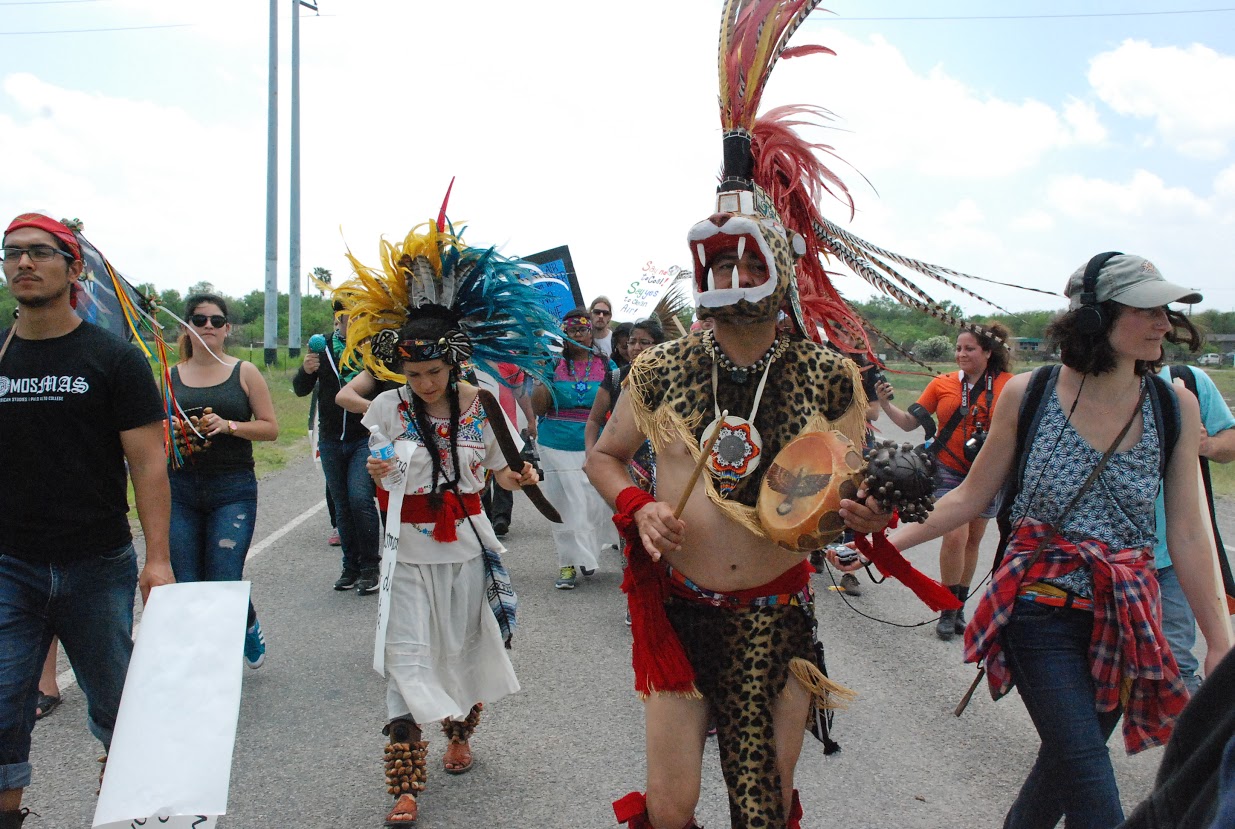
by Deep Green Resistance News Service | Apr 24, 2016 | Mining & Drilling, Protests & Symbolic Acts
Via Censored News
EAGLE PASS, Tex. — Native American Groups gathered today for a historic rally and march to protest the open-pit coal strip mine in Eagle Pass, Tex. The protesters called on the U.S. Army Corps of Engineers to rescind the mine’s permit, halt expansion and protect the land from further destruction. The project, owned by Dos Republicas Coal Partnership, mines lignite coal, which is transported by train from Maverick County across the border to be burned in a Mexican coal-fired power plant. The mine began operating several months ago, despite local opposition, and is harming the ancestral homelands of many Native groups and damaging sacred lands and more than 100 archaeological sites.
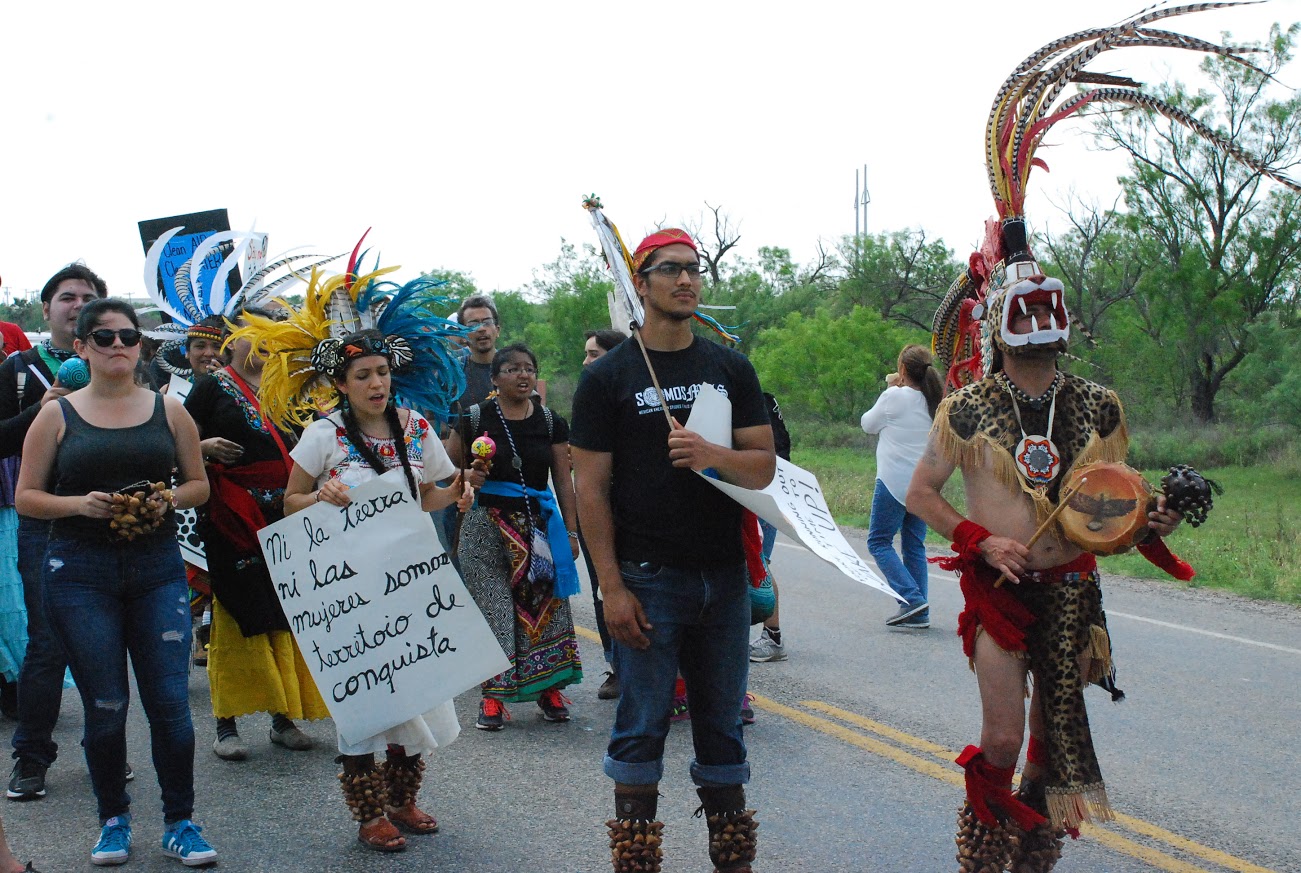
“This mine has already caused irreparable damage, destroying multiple burial sites and erasing our cultural heritage in the process,” said Maria Torres, Tribal Chairwoman of the Pacuache Clan of Texas. “This land is our patrimonial heritage, and it holds the story of our ancient aboriginal people—how we lived and how we died. When we lose access to our land and to the ancient wildlife of the area, from the jaguarundi and ocelot to crucial plant life, we lose part of our heritage and our connection with Mother Earth.”
Many Native groups say they were not properly consulted by Federal agencies as required prior to granting the permits necessary for the coal mine to open. More than eight thousand Eagle Pass residents and allies signed a petition in opposition to the Dos Republicas mine before its opening.

“This project is the worst example of environmental injustice I’ve seen,” said Dr. Jonathan Hook, former Director of Environmental Justice and Tribal Affairs for the EPA, Cherokee Nation citizen and Maverick County resident. “Everything about it is wrong. Given the incomplete processes and potential damage to one of the most vulnerable communities in the country, the Dos Republicas mine should have been stopped before it even started.”
Representatives from the Lipan Apache Band of Texas, Pacuache Band Coahuiltecan Nation, Carrizo-Comecrudo Tribe of Texas, and American Indian Movement of Central Texas were present at the Saturday event, which included Native regalia, drumming, and other cultural expressions along with large banners, signs, and puppets.
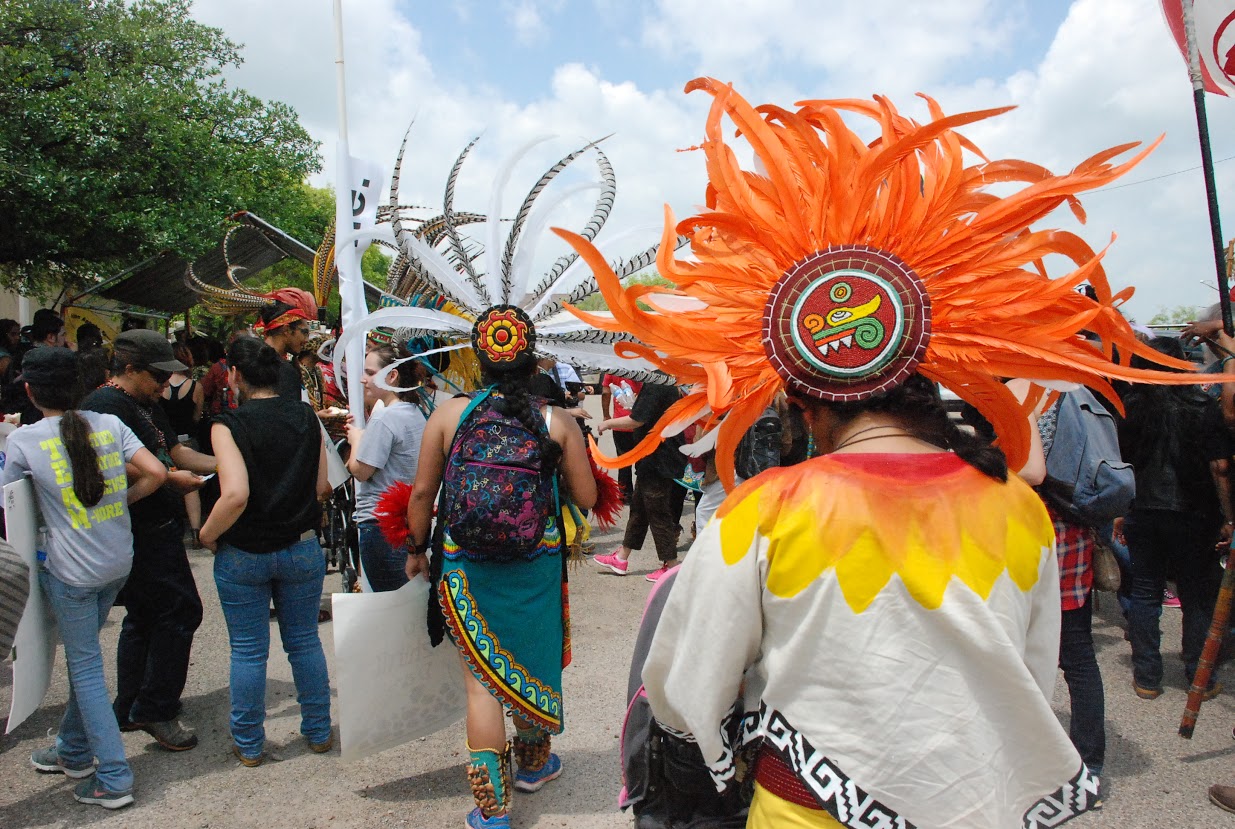
“Native leaders, tribal members and allies from across the country are uniting here today, and they join thousands from the area who are standing up against this disastrous project,” said Dr. Tane Ward, and Native and decolonial organizer working with the Sierra Club. “It’s unclear why the state of Texas has been so supportive of the controversial mining project. Not only does it harm culturally rich and historic land, the Dos Republicas mine threatens the safety and livelihood of those who live nearby all so the coal can be shipped to Mexico and burned in coal plants. It’s time for this dangerous project to be stopped, once and for all.”
Read more about the Dos Replicas Mine at the Sierra Club Lone Star Chapter’s website.

by Deep Green Resistance News Service | Apr 16, 2016 | Climate Change, Education, Strategy & Analysis
Stopping Coal and Oil Trains Through
Civil Disobedience: Stories of Courage
on the Front Lines of Climate Change
Saturday, April 23rd at 7pm
Spokane Community College – Lair Student Center
Free admission
Featured speakers:
Event host – Direct Action Spokane
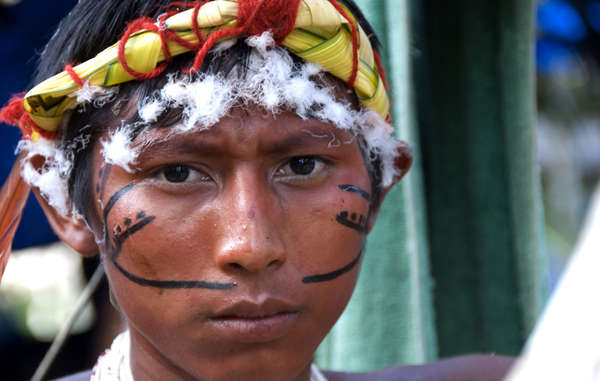
by Deep Green Resistance News Service | Mar 31, 2016 | Lobbying, Toxification
Featured Image: Gold miners have been invading Yanomami land for decades. © Fiona Watson/Survival International
Mercury poisoning is devastating tribal peoples across Amazonia, Survival International warned the U.N today.
In a letter to the U.N Special Rapporteur for Health, Survival International highlighted the failure of South American governments to address the contamination.
The unmonitored use of mercury, such as in illegal alluvial gold mining, often takes place on tribal peoples’ lands. Discriminatory attitudes towards tribal peoples mean that little action is taken to control it.
In Peru, 80% of a Nahua community have tested positive for high levels of mercury poisoning. 63% of those affected are children. Symptoms include anemia and renal failure, and one child has already died displaying symptoms consistent with mercury poisoning.
The Peruvian government has known about the mercury contamination since 2014 but has done little to identify the source. It is possible that other tribal peoples in the area have been affected, including uncontacted peoples.
In Brazil, new statistics reveal alarming rates of mercury poisoning amongst the Yanomami and Yekuana. 90% of Indians in one community are severely affected.
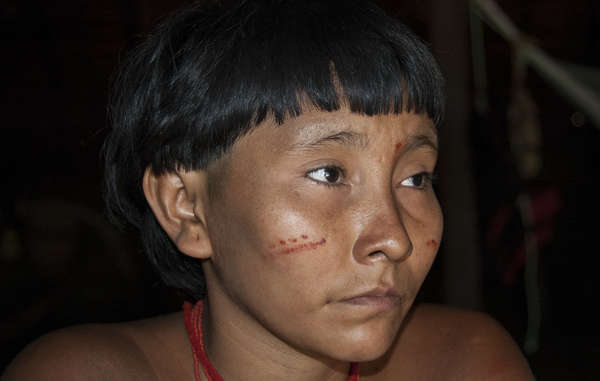
Without medical attention, mercury posioning can be lethal. Children and women of child-bearing age are most vulnerable
© Fiona Watson/Survival
Illegal gold miners operate on Yanomami land, polluting the rivers and forest with mercury. Uncontacted Yanomami are particularly in danger as many miners work near where they live.
Indigenous spokesman Reinaldo Rocha Yekuana said: “We are worried about the results of this research. This pollution affects plants, animals, and future generations.”
The Brazilian authorities have known about the mercury contamination since at least the 1980s, yet have failed to put a permanent stop to the illegal gold mining. Little has also been done to treat the affected Indians.
In Venezuela, several tribes including the Yekuana, Yanomami, Piaroa, Hoti and Pemon are also being devastated. 92% of Yekuana women in one region have levels of contamination far exceeding accepted limits.
Survival’s Director, Stephen Corry said: “These governments are sitting on a ticking time bomb. Every week that they fail to act, more and more indigenous peoples are being harmed. When mercury poisoning is identified, the source must be halted immediately and those affected must be treated. The effects will be catastrophic if indigenous peoples’ lands aren’t protected.”
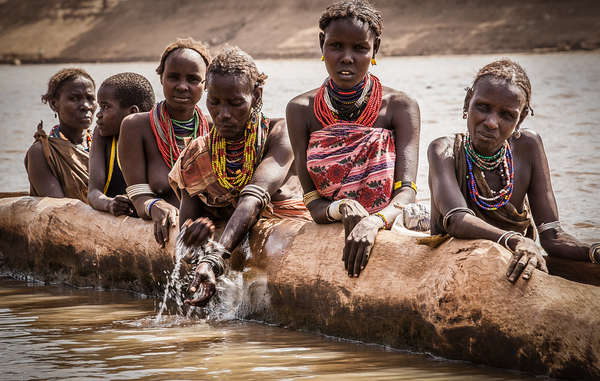
by Deep Green Resistance News Service | Mar 14, 2016 | Biodiversity & Habitat Destruction, Lobbying
Survival International has reported Italian engineering giant Salini to the OECD (Organization for Economic Cooperation and Development) over its construction of a controversial dam which is set to destroy the livelihoods of hundreds of thousands of people in Ethiopia and Kenya.
The dam has cut off the Omo river’s regular flooding, which 100,000 people rely on to water their crops and livestock and a further 100,000 depend on indirectly. According to experts, this could also spell the end for Lake Turkana – the world’s largest desert lake – and disaster for the 300,000 tribespeople living along its shores.
Salini did not seek the consent of local people before building the dam, but claimed that an “artificial flood release” would compensate them for their losses. However, this promised flood never came and thousands of people now face starvation.
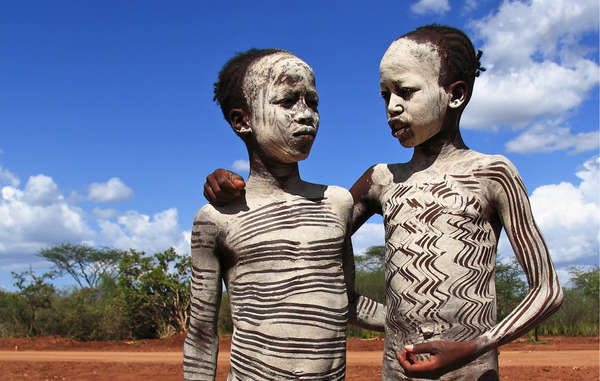
Up to half a million people face starvation as a result of the dam Salini has constructed on the Omo river.
© Magda Rakita/Survival International
The region is one of the most important sites in early human evolution, and an area of exceptional biodiversity, with two World Heritage Sites and five national parks. The head of Kenya’s conservation agency said last week that the dam is unleashing “one of the worst environmental disasters you can imagine.”
Survival’s Director Stephen Corry said: “Salini has ignored crucial evidence, made false promises and ridden roughshod over the rights of hundreds of thousands of people. Thousands are now facing starvation because Italy’s largest contractor, and one of its best known companies, didn’t think human rights were worth its time. The real consequences of the Ethiopian government’s devastating policies for its country’s development, which are shamefully supported by western aid agencies like the UK’s DFID and USAID, are plain for all to see. Stealing people’s land and causing massive environmental destruction is not progress, it is a death sentence for tribal peoples.”













